Workplace Environment, Health & Safety
Health and Safety
Basic Policy
Alps Alpine believes in the importance of providing clean, safe workplaces where all employees feel at ease while maintaining good physical and mental health. For Japan, we have established an occupational health and safety policy and operate an occupational health and safety management system.
Occupational Health and Safety Policy
Alps Alpine aims for a corporate culture that promotes health and safety, encouraging communication among colleagues in a workforce where everyone plays a role in occupational health and safety activities and ensuring compliance with related laws, ordinances, requests and requirements.
- We strive to prevent work-related accidents through the realization of workplace environments where employees feel safe working because recurrence prevention measures are fully implemented and hazard sources are eliminated.
- We aim to promote healthy body and healthy mind maintenance by pursuing companywide health and productivity management in partnership with the health insurance association.
Promotion Structure
Alps Alpine has in place a Central Health and Safety Conference with the vice president in charge of administration as the person in charge. Through the conference, the company sets policy and advances activities relating to health and safety, health promotion, fire prevention and traffic safety in Japan, and endeavors to prevent accidents, identify accident causes, and prevent recurrence. Results of activities are regularly reported to the Board of Directors through the Sustainability Committee. Overseas, each base carries out its own activities.
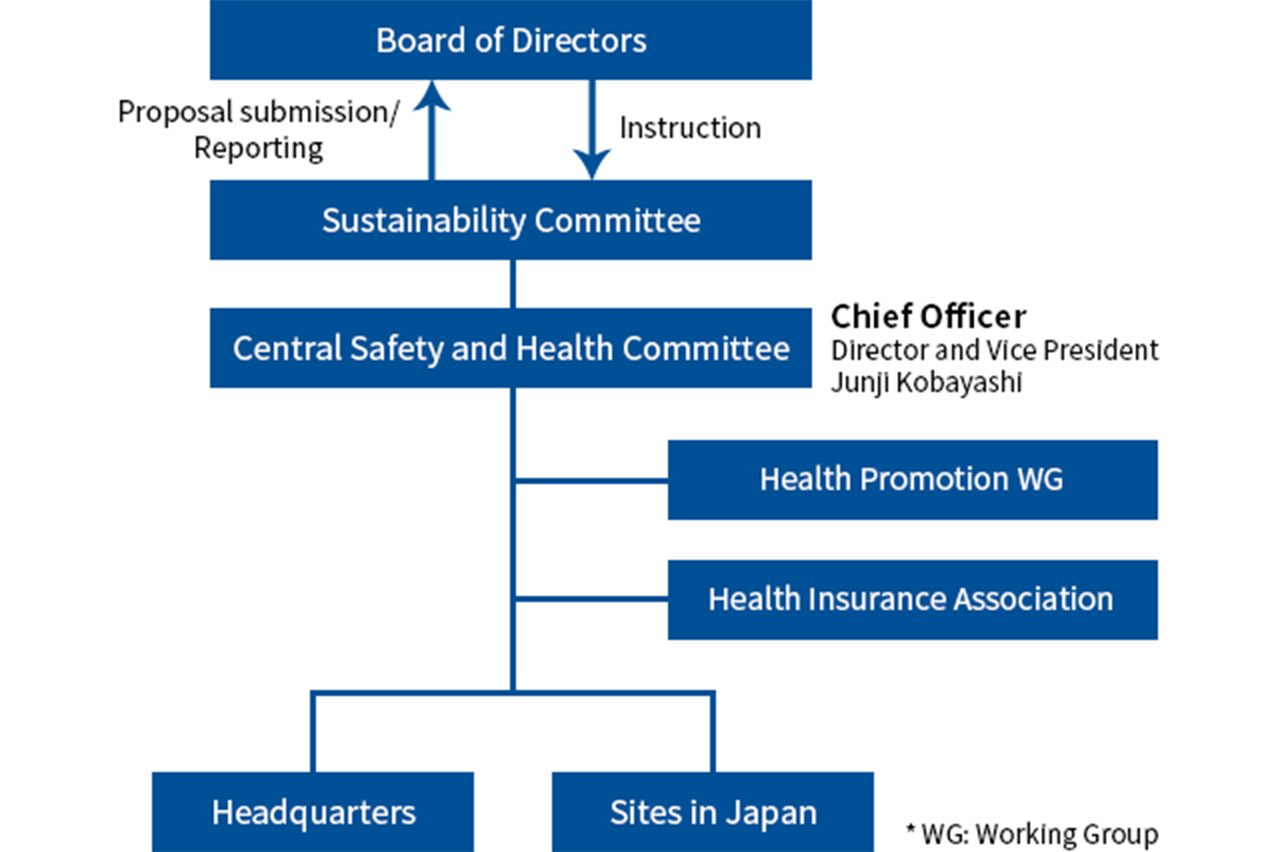
Health and Safety Assessments
Health and safety assessments, which also cover chemical substance management, are conducted once a year. Assessments (initial, follow-up or change assessments) are also carried out when establishing, or making changes to, new equipment or facilities and efforts are made to reduce the risk of accidents. In cases where an accident is narrowly avoided, problems are discovered, or an accident has occurred, corrective action assessments and preventive measures are shared across the organization and used to prevent a recurrence.
Work-Related Accidents – Occurrence and Countermeasures
Alps Alpine pursues activities with a goal of zero serious work-related accidents (accidents resulting in death and work-related accidents resulting in a long-term disability). No such accidents occurred in fiscal 2024 (scope: employees, temporary employees, and subcontractor employees based on site). The number of workplace accidents increased with the number of falls reaching a new high for the third year in a row. In addition to measures to reduce hazard sources, activities were expanded to encompass measures at the individual level. This was done by encouraging workers to have greater knowledge of their own bodies and habits through posture, gait and body composition measurements. And because the number of commuting accidents was higher than the previous year, we seek to raise road safety awareness. The aim is 100% participation in road safety courses for workers who commute by car or bicycle.
| Unit | FY2022 | FY2023 | FY2024 | Scope*1 | |
|---|---|---|---|---|---|
| No. of serious work-related accidents | Cases | 0 | 0 | 0 | Consolidated |
| No. of work-related accidents | Cases | 65 | 70 | 83 | Consolidated |
| Cases | 7 | 7 | 8 | Non-consolidated | |
| Frequency rate*2 | - | 0.49 | 0.51 | 0.49 | Non-consolidated |
| Manufacturing industry frequency rate average (electrical machinery and equipment manufacturing) |
- | 0.53 | 0.54 | 0.67 | Japan |
| Severity rate*3 | - | 0.001 | 0.005 | 0.001 | Non-consolidated |
| - | - | 0.026 | Consolidated |
*1 Under both consolidated and non-consolidated scopes, workers covered are workers under Alps Alpine supervision (incl. contract and temporary employees).
*2 Lost-time injury frequency rate (LTIFR): Number of casualties due to work-related accidents (one or more days absence from work) ÷ Total number of working hours × 1,000,000
*3 Lost-time injury severity rate (LTISR): (Total number of lost workdays ÷ Total working hours) × 1,000
Work-Related Accidents – Targets and Results
| FY2024 | FY2025 | ||||||
|---|---|---|---|---|---|---|---|
| Target | Result | Scope*1 | Target | Scope*1 | |||
| No. of serious work-related accidents*2 | 0 | 0 | Consolidated | No. of serious work-related accidents*2 | 0 | Consolidated | |
| No. of occupational accidents*3 | 25% decrease from previous year | 48% decrease from previous year | Non-consolidated | Occupational accidents*3 | |||
| (1)Prevent lost-time accidents due to falls | (1) Implement safety training once a year; Complete (100%) hazard source identification at all workplaces |
Non-consolidated | |||||
| (2)Global sharing of accident details and countermeasures | (2)100% | Consolidated | |||||
| No. of commuting accidents*3 | 50% decrease from previous year | 150% increase from previous year | Non-consolidated | Commuting accidents*3 (prevent accidents causing third-party injuries or self-injury) | 100% participation in road safety courses for workers who commute by car or bicycle | Non-consolidated | |
*1 Workers covered are workers under Alps Alpine supervision (incl. contract and temporary employees).
*2 Accidents resulting in death and work-related accidents resulting in a long-term disability
*3 Occupational/commuting accidents: Work-related accidents with or without absence from work
Education and Training
Health and Safety Education
To help prevent work-related accidents, health and safety education is provided to all employees, including temporary employees, once a year. In fiscal 2024, health and safety education was provided to around 9,000 employees (in Japan).
Road Safety Courses
Road safety courses were implemented to help prevent road accidents. Around 8,800 employees (in Japan) took part. Other measures include bicycle safety education and gait and body composition measurements, which are used to help prevent accidents due to falls.
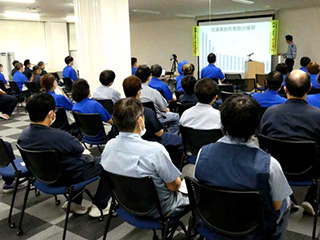
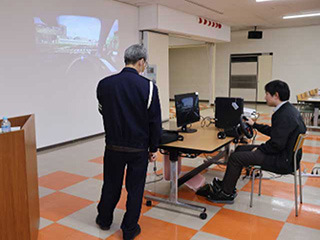
Drink-and-Drive Eradication Campaign
Efforts to eradicate drinking and driving in Japan include the provision of warnings to all employees in morning assemblies and via health and safety bulletins. We also work to raise awareness by having individual employees sign a declaration of support for the eradication of drinking and driving.
Additionally, alcohol testing is mandatory prior to driving on the job.
Introduction of Occupational Health and Safety Management System
We have acquired ISO 45001 certification, an occupational health and safety management system standard, mainly at our production sites, and strive to reduce and manage health and safety risks through risk assessment and compliance with laws and regulations. The certification rate for all global production sites is 68% (as of October 2025).
Health and Productivity Management
Basic Policy
Alps Alpine formulated its Declaration of Health and Productivity Management in April 2021, having recognized managing the health of our employees as an important management priority. We actively advance measures that include regular health checkups and stress checks, efforts to increase the ratio of employees provided with special health guidance, and a no smoking policy. In addition, we are currently addressing the urgent task of lowering the number of people taking mental health leave of absence.
Declaration of Health and Productivity Management
Alps Alpine regards the well-being of its employees and their families as a foundation for realizing its Corporate Philosophy, “Alps Alpine innovates value for humans and society on a brighter planet.” We are committed to creating safe and comfortable work environments while contributing to improving the mental and physical wellbeing of each individual.
Hideo Izumi
Representative Director, President
Targets and Results
| Measure | KPI/Target | Result | Scope | |
|---|---|---|---|---|
| FY2024 | Reduce the smoking rate | 2% decrease from the previous year | No decrease from FY2023 | Non-consolidated |
| Reduce the number of high-stress workplaces*1according to stress checks | Zero workplaces with a total score above 120 | 14 workplaces | ||
| Strengthen approaches toward employees taking mental health leave of absence | Less than 0.6% of all employees taking mental health leave of absence by FY2026 | 0.9% | ||
| FY2025 | Improve high-stress workplaces*1 | 100% high-stress workplace*1 improvements implementation rate | - | |
| Strengthen onboarding | 4.2% leave of absence rate for employees with less than 3 years’ service | - | ||
| Strengthen follow-up for first-time returning employees | 80% first-time return-to-work rate | - | ||
| One-on-one meetings and health guidance by health professionals | 70% specific health guidance implementation rate*2 | - |
*1 High-stress workplace: Workplaces found to have high stress levels according to stress checks
*2 The implementation rate is the percentage of employees who have had initial meetings for specific health guidance. From fiscal 2025, eligibility for specific health guidance was extended to employees subject to measures for preventing severe cases.
Mental Health Initiatives
Stress Check Implementation and Application
Employees in Japan, or seconded overseas from Japan, routinely undergo stress checks to promote self-awareness about their own stress levels. When implementing stress checks, the opportunity is taken to communicate the purpose of stress checks to employees and teach them about self-care. After implementation, employees are encouraged to build awareness and engage in self-care. Depending on the results, employees might receive a follow-up consultation, or perhaps a recommendation to partake in an employee assistance program (EAP) or visit the health room for advice.
Additionally, correlations between engagement survey findings and findings of organizational analysis of stress checks are identified, and steps are taken to reduce stress in workplaces, for example through the formulation of workplace environment improvement plans for high-stress workplaces with the assistance of general affairs and health rooms. These efforts led to improvements at four out of 10 high-stress workplaces in fiscal 2024.
Mental Health Measures
Training is provided to help enhance awareness about mental health. Line care training for managers follows a more practical, effective curriculum, covering the interpretation and use of organizational analysis findings and incorporating case studies. Support for new employees is provided through post-placement interviews and monthly pulse surveys during their first year. For mid-career recruits, additional pulse surveys, roundtable meetings and a mentor program were introduced, enhancing frameworks allowing them to hit the ground running. Effort also goes into assisting a return to work after a leave of absence. This involves reviewing return-to-work programs and reminding returning employees about support service contacts.
Approaches to Health Issues
Reducing Passive Smoking
To lower the risk of passive smoking by employees, Alps Alpine introduced a total ban on smoking on company premises at all bases in Japan in 2022. However, certain issues emerged leading to a tentative switch at some bases to a ban only on smoking indoors. Efforts aiming for a future return to a total ban on smoking on company premises persist.
Consultations on quitting and provision of monetary assistance for visits to smoking cessation clinics continue. And in 2024, we started using Minchalle, an app that helps people with a common goal develop new habits. The number of employees who have successfully quit smoking is on the rise.
Alps Alpine seeks to prevent passive smoking from a variety of angles. This includes participation in the Yellow Green campaign run by the Japan Society for Tobacco Control, involving the illumination of Head Office and other business locations, and the display of posters for No Smoking Day (the 22nd of every month) as a member of the Tobacco Control Medical-Dental Research Network.
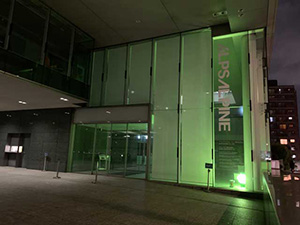
Illumination of Alps Alpine Headquarters
Specific Health Guidance
Alps Alpine collaborates with the health insurance association to provide specific guidance to employees to promote better lifestyle habits. The framework in place allows employees to choose to receive guidance either face-to-face or via one of three online methods. The implementation rate in fiscal 2024 was 70%. From 2025, we are putting further effort into collaborative preventive care alongside the health insurance association, including through new measures to prevent severe cases.
Protecting Employees from Cancer
In 2024, Alps Alpine registered as a partner in the Corporate Action to Promote Cancer Control program run by Japan’s Ministry of Health, Labour and Welfare. We will take proactive steps to lift the percentage of employees who undergo cancer screening.

Workplaces that Understand Women’s Health Issues
To support the health of female employees, Alps Alpine makes it possible for women to receive gynecological checkups at all bases in Japan. We also assist with checkup costs and cover the costs of tests taken through local authorities.
In addition, we have facilities such as nursing rooms and showers at each base. We create environments where even the child-raising generation finds it easy to work.
Raising Health Awareness
Dealing with Infectious Diseases and Other Global Health Issues
In Japan, we strive to prevent infectious diseases through measures including provision of influenza vaccinations, opportunities for rubella antibody testing, routine reporting of infections by employees, and provision of rubbing alcohol as an antiseptic in appropriate locations on company premises.
For employees seconded overseas, we also provide vaccinations for hepatitis A, hepatitis B, tetanus, Japanese encephalitis, rabies, and typhoid fever, as well as the MMR vaccine, and hold annual health checks. Depending on the overseas location, we have arrangements in place to ensure that employees depart for their overseas posting feeling secure, for example with the provision of the hepatitis A vaccination.
Physical Exercise
As an initiative addressing lack of physical exercise as a health issue, the company teams up with the health insurance association to hold walk rallies twice a year, making use of an app, and to run an annual My Health Improvement Challenge, in which employees set a health target to attempt over a one-month period. Commemorative items are presented to employees with the best results and those who achieve their targets.
Health-Conscious Cafeteria Menus
Alps Alpine implements measures aimed at raising health awareness through food. These include provision of healthy meals, information displays, and recommendations to use health app Asken. We have acquired Smart Meal certification offered by the Consortium for Healthy Meal and Food Environment. We also belong to the Sanriku Joban Mono Network, supporting efforts to expand consumption of produce from Sanriku and Joban regions.
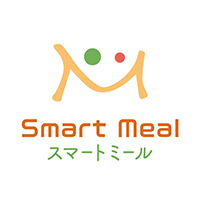
Health-Related Events
Sleep seminars, body composition measurement, gait checks and other activities are implemented at bases in Japan according to their particular health issues. Believing that good health comes from a healthy diet, we also conduct “vege checks” at all bases to encourage employees to review and modify their diets.
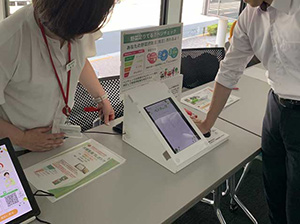
Health & Productivity Management Outstanding Organization – Six Years in a Row
For the sixth consecutive year, starting in 2020, Alps Alpine has been recognized as a Health & Productivity Management Outstanding Organization within the large enterprise category of the certification program run by Japan’s Ministry of Economy, Trade and Industry (METI).
The program recognizes large enterprises, small and medium-sized enterprises, and other organizations making outstanding efforts in health and productivity management in line with health-related challenges in communities or health-conscious activities led by the Nippon Kenko Kaigi.
Alps Alpine positions employee health maintenance and promotion as an important theme for management and will continue to act proactively in this area.
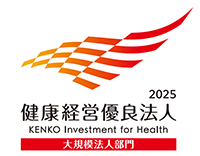
Health Management Data
| Mental Health Initiatives | Scope | FY2021 | FY2022 | FY2023 | FY2024 | |
|---|---|---|---|---|---|---|
| Stress check implementation rate | Non-consolidated | 96% | 95% | 95% | 94% | |
| Mental health leave of absence rate | Consolidated | - | - | - | 0.2% | |
| Non-consolidated | - | - | 0.9% | 0.9% | ||
| Approaches to Health Issues | Scope | FY2021 | FY2022 | FY2023 | FY2024 | |
| Specific health guidance implementation rate*1 | Non-consolidated | 40.0% | 62.8% | 65.4% | 69.7% | |
| Regular health check rate | 100% | 99% | 100% | 100% | ||
| Follow-up examination rate | 59% | 79% | 71% | 68% | ||
| Metabolic syndrome observation rate | 20% | 19% | 21% | 20% | ||
| Healthy weight maintenance rate:ages 40 and over*2 | 58.5% | 58.3% | 58.7% | 59.3% | ||
| High blood pressure risk rate:ages 40 and over*3 | 0.8% | 1.0% | 0.9% | 1.0% | ||
| Percentage of employees considered at risk for high blood sugar*4 | 0.6% | 0.7% | 0.5% | 0.8% | ||
| Poor diabetes control rate*5 | 1.7% | 1.7% | 2.0% | 2.0% | ||
| Smoking rate*6 | 25.0% | 24.0% | 22.0% | 22.0% | ||
| ages 40 and over | 26.9% | 25.4% | 24.7% | 25.2% | ||
| No-smoking challenge success rate | 84% | 80% | 20% | 57% | ||
| Percentage of employees who drink alcohol regularly*7 | 8.2% | 11.4% | 13.0% | 11.4% | ||
| Raising Health Awareness and Other Health-Related Factors | Scope | FY2021 | FY2022 | FY2023 | FY2024 | |
| Percentage of employees who exercise regularly: ages 40 and over*8 | Non-consolidated | 19.4% | 18.6% | 22.4% | 23.6% | |
| Walk rally participation rate | 6.5% | 11% | 13% | 11% | ||
| Percentage of employees who get sufficient rest through sleep: ages 40 and over | 65.8% | 65.7% | 64.0% | 59.8% | ||
| Absenteeism*9 | - | - | 157people | 148people | ||
| Presenteeism*10 | - | - | - | 71% | ||
*1 Implementation rate is the percentage of employees who have had initial meetings for specific health guidance.
*2 Percentage of employees with a BMI between 18.5 and 25
*3 Percentage of employees with a systolic blood pressure of 180 mmHg or higher or a diastolic blood pressure of 110 mmHg or higher
*4 Percentage of employees with a fasting blood sugar level of 200 mg/dl or higher
*5 Percentage of employees with HbA1c of 7.0% or higher
*6 Percentage of employees who are regular smokers
*7 Percentage of employees who drink occasionally or every day and consume the equivalent of roughly 360 ml of sake each drinking day
*8 Percentage of employees who exercise for 30 minutes or more at a time at least twice a week
*9 Number of employees on sick leave for 30 days or more, including paid leave and multi-purpose leave
*10 University of Tokyo Single-item Presenteeism Question (SPQ): “On a scale from 1% to 100%, where 100% is the best job performance you could have at your job if unimpeded by sickness or injury, how would you rate your overall job performance on the days you worked during the past four weeks (28 days)?”